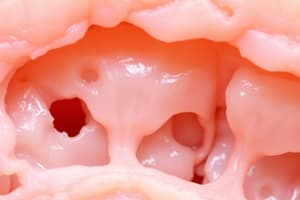Podcast
Questions and Answers
Which of the following can lead to pathological hypertrophy in the heart?
Which of the following can lead to pathological hypertrophy in the heart?
- Skin hyperplasia
- Hormonal stimulation
- Myocardial infarction (correct)
- Normal adaptation
During pregnancy, what happens to the size of the uterus?
During pregnancy, what happens to the size of the uterus?
- It undergoes hypertrophy (correct)
- It remains the same
- It undergoes hyperplasia
- It decreases
Which of the following best describes the subject of study in pathology?
Which of the following best describes the subject of study in pathology?
- The morphological changes associated with the disease (correct)
- The progression of the disease
- The cause of the disease
- The signs and symptoms of the disease
What are the mechanisms responsible for myocardial hypertrophy?
What are the mechanisms responsible for myocardial hypertrophy?
What is the role of general pathology in the field of medicine?
What is the role of general pathology in the field of medicine?
What is a major cause of death and a risk factor for heart failure if left undiagnosed?
What is a major cause of death and a risk factor for heart failure if left undiagnosed?
Why is it important to study the pathogenesis of a disease?
Why is it important to study the pathogenesis of a disease?
Which of the following diseases exemplifies the need to understand the mechanism of a disease for effective treatment?
Which of the following diseases exemplifies the need to understand the mechanism of a disease for effective treatment?
Which type of cells in our body are continuously dividing and renewing every day?
Which type of cells in our body are continuously dividing and renewing every day?
What is the term used to describe a change in the phenotype of cells, specifically a change in the differentiation of epithelial cells?
What is the term used to describe a change in the phenotype of cells, specifically a change in the differentiation of epithelial cells?
Why is dysplasia not considered an adaptation?
Why is dysplasia not considered an adaptation?
What is the term used to describe an increase in the size of cells?
What is the term used to describe an increase in the size of cells?
Which of the following statements best describes Rudolf Virchow's contribution to pathology?
Which of the following statements best describes Rudolf Virchow's contribution to pathology?
Which of the following best describes the concept of adaptation in cells?
Which of the following best describes the concept of adaptation in cells?
What is the term used to describe an increase in the size of a cell without an increase in the number of cells?
What is the term used to describe an increase in the size of a cell without an increase in the number of cells?
What is the term used to describe a decrease in the size of a cell or a decrease in the size and number of cells?
What is the term used to describe a decrease in the size of a cell or a decrease in the size and number of cells?
Which of the following is NOT a cause of pathological atrophy?
Which of the following is NOT a cause of pathological atrophy?
What is the main mechanism of atrophy?
What is the main mechanism of atrophy?
Which of the following is NOT a cause of physiological atrophy?
Which of the following is NOT a cause of physiological atrophy?
What is the main difference between hypertrophy and hyperplasia?
What is the main difference between hypertrophy and hyperplasia?
Which of the following is an example of compensatory hyperplasia?
Which of the following is an example of compensatory hyperplasia?
What is the main danger of hyperplasia?
What is the main danger of hyperplasia?
Which of the following is a pathological hyperplasia?
Which of the following is a pathological hyperplasia?
What are the mechanisms of hyperplasia?
What are the mechanisms of hyperplasia?
Which type of cells undergo metaplasia?
Which type of cells undergo metaplasia?
What is the most common cause of epithelial metaplasia in the respiratory tract?
What is the most common cause of epithelial metaplasia in the respiratory tract?
What happens to the normal epithelium in the respiratory tract during metaplasia?
What happens to the normal epithelium in the respiratory tract during metaplasia?
Why does metaplasia occur in the respiratory tract?
Why does metaplasia occur in the respiratory tract?
What important mechanisms of protection are lost during metaplasia in the respiratory tract?
What important mechanisms of protection are lost during metaplasia in the respiratory tract?
What is the danger of metaplasia in the respiratory tract?
What is the danger of metaplasia in the respiratory tract?




